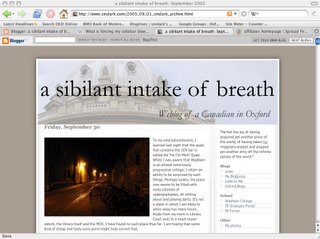The possibility of having to walk through snow to reach the Library Court showers was realized for the first time today. As described on Ruth Anne’s blog, we got a dusting last night that has not endured through the warmer part of the day. Indeed, having to tramp through it in bare feet was actually proof of my waking up acceptably early. I was initially alerted to this unexpected meteorological phenomena by Tanushree’s audible jubilation this morning; my fellow Wadham inhabitant had not previously encountered snow. It’s rare enough for Vancouverites, as well. I wouldn’t mind getting a foot or so of it at some point, if only so I could zip around Oxford getting photos that look at least a bit different.
I heard, but did not see, that Abra – one of the Canadian law students here – has returned to Library Court: increasing the population by 50% over yesterday. No indication yet of where Nora is, though I am quite sure she has returned to the U.K. from North Carolina. The prospect of re-population is a welcome one, as is that of trying the recipe for dahl that Tanushree gave me today. Perhaps an upcoming New Year’s party will provide it. I’ve been a fan of lentils for as long as I can recall, and could certainly make use of some additional protein.
Tomorrow, I am making my third trip to London since arriving in the UK, as well as my second for which the city itself is my objective. In the evening, I will be meeting with ITG, but I will probably go a bit earlier and take a wander through the Tate Modern and a few other places. Perhaps there will be some opportunity to meet with Sarah Johnston, if only for a quick cup of coffee.
Having tallied up the surprisingly high cost of the Baltic jaunt, I must actively try not to further increase a credit card bill that has already become somewhat daunting. At the same time, I need to resist the urge to overcompensate by falling back on a cheese and bagels diet (which I’ve sworn off, for now) or complete social isolation. With snap peas 80% off, after Christmas, there is no need.
There was one nice thing that happened this evening, but this isn’t really the place to discuss it.
- People concerned with putting images on the web might find this page interesting and useful. It’s about the nuts and bolts behind different image formats. In particular, the discussion of the specifics of JPEG compression is probably useful for digital photographers.
- If you are younger than 30 today and living in the developed world, you are likely to be alive when the human population peaks: at around ten billion people, around 2050. It’s an astonishing thought, and a welcome one, given that slowing population growth should increase our ability to reduce poverty, and decrease the strain we are putting on the planet’s resources.
- Finally, I love The Economist‘s Christmas issue. It’s full of exactly the kind of wonderful, obscure facts that prompt people to ask “How do you know that?” in astonished tones, when you relate them. If you buy only one issue a year, this is the one to choose.
- General Sir Rupert Smith, who I saw speak in late October, has a new book on the changing character of war out: The Utility of Force. It seems to have been well reviewed, and has consequently been added to my ever-lengthening discretionary reading list.


